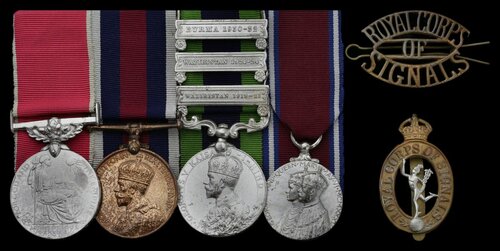
Auction: 21001 - Orders, Decorations and Medals (conducted behind closed doors)
Lot: 365
The 1934 B.E.M. and 1937 Indian Police Medal group of four awarded to Sergeant H. J. McLennan, Royal Corps of Signals and Instructor, Burma Military Police - whose combination of awards is unique to the Corps
British Empire Medal, G.V.R., Civil Division (Sgt. H. J. McLennan. R. Signals); Indian Police Medal, G.V.R., for Distinguished Conduct (Sergeant H. J. McLennan, R.S., Burma Mily. Police); India General Service 1908-1935, 3 clasps, Waziristan 1919-21, Waziristan 1921-24, Burma 1930-32 (2312015 Sgmn. H. J. McLennan, R. C. Of Sigs.); Coronation 1935, mounted court-style for wear by Spink & Son, lacquered, very fine (4)
B.E.M. London Gazette 4 June 1934.
Indian Police Medal Gazette of India Extraordinary 1 February 1937:
‘His services were placed at the disposal of the Government of Burma for employment with the Burma Military Police with effect from 25 November 1930. He is now on leave and will revert to duty with his own Corps. He joined as an Operator Instructor on the Staff of the W/T/ Group, Burma Military Police, which was then being raised. He saw the W/T Group evolve from a collection of V/T/ Signallers and raw recruits into the most efficient Wireless Service which have during the past open season been working with Regular British W/T Personnel in the Wa States. During the past 2 years the work
of the W/T Group in those States has brought many of the Personnel comprising it rewards and honours from the Government. Every recipient of such rewards and honours owe them chiefly to the training of an instruction imparted to them by Sergeant McLennan. He himself worked continuously in a completely satisfactory manner which has won admiration. His general conduct was an example to all ranks and showed to all what a first class British Non-Commissioned Officer could be.'
Hector James McLennan was born on 4 November 1903, the son of William McLennan and Margaret Lockhart McLennan, of 6 Church Street, Patrick, Glasgow. Joining the Royal Signals after the end of the Great War, he saw varied service in Waziristan from 1919-24 (Medal & 2 clasps). McLennan was posted to the Indian Unattached List and allocated No. 2229, part of a numbering only used in connection with service in the Indian Signal Corps.
The roll states service with 'Wireless Waziristan' - formed from men from No. 3 Wireless Signal Squadron, Indian Signal Corps. It had been known at the start of the campaign as 'Frontier Wireless Troop'. No. 3 Wireless Signal Squadron would become No. 2 Wireless Company, 'A' Corps Signals in 1922 and the detachments in the region were known as 'Wireless Wazirforce' in the latter part of the 1921-24 campaign (The Wire, February 1923, refers).
By the 1932 edition of The Wire he is noted with an asterisk next to his name which indicates he is on the Special Roster (India). The Special Roster (India) was men posted to and from India from 1921 (when Royal Signals was given the responsibility of finding the British component of the Indian Signal Corps) the units in India included a large number of men from other arms, mostly Infantry, who had been posted to the IUL, some from its formation as the Indian Signal Service in 1911. They did not transfer to Royal signals until 1927 (with the exception of most of the Royal Engineers). The Special Roster (India) was established in late 1927 and comprised these attached men, and those who had transferred to Royal Signals in the interim and some Royal Signals soldiers who were permanently employed in India. They were promoted against the establishment of the Special Roster rather than against the Royal Signals roster.
His service in Burma would have been with No. 8 Pack Wireless Section, 'B' Corps Signals (the only Det from that unit deployed). He evidently remained in Burma when the force withdrew and took up his post with the Burma Military police. There are notes of congratulation on his promotion in the 'B' Corps Signals Wire entries for early 1932. He also earned the Coronation Medal whilst attached to the Burma Military Police.
Having been awarded his richly-deserved I.P.M. in 1937, by May he took his discharge from The Royal Corps of Signals. He died on 9 December 1940, aged just 37 as a result of acute cerebral congestion and heart failure; sold together with two metal Corps of Signals badges, copied MIC and research.
Subject to 20% VAT on Buyer’s Premium. For more information please view Terms and Conditions for Buyers.
Sold for
£950
Starting price
£700




